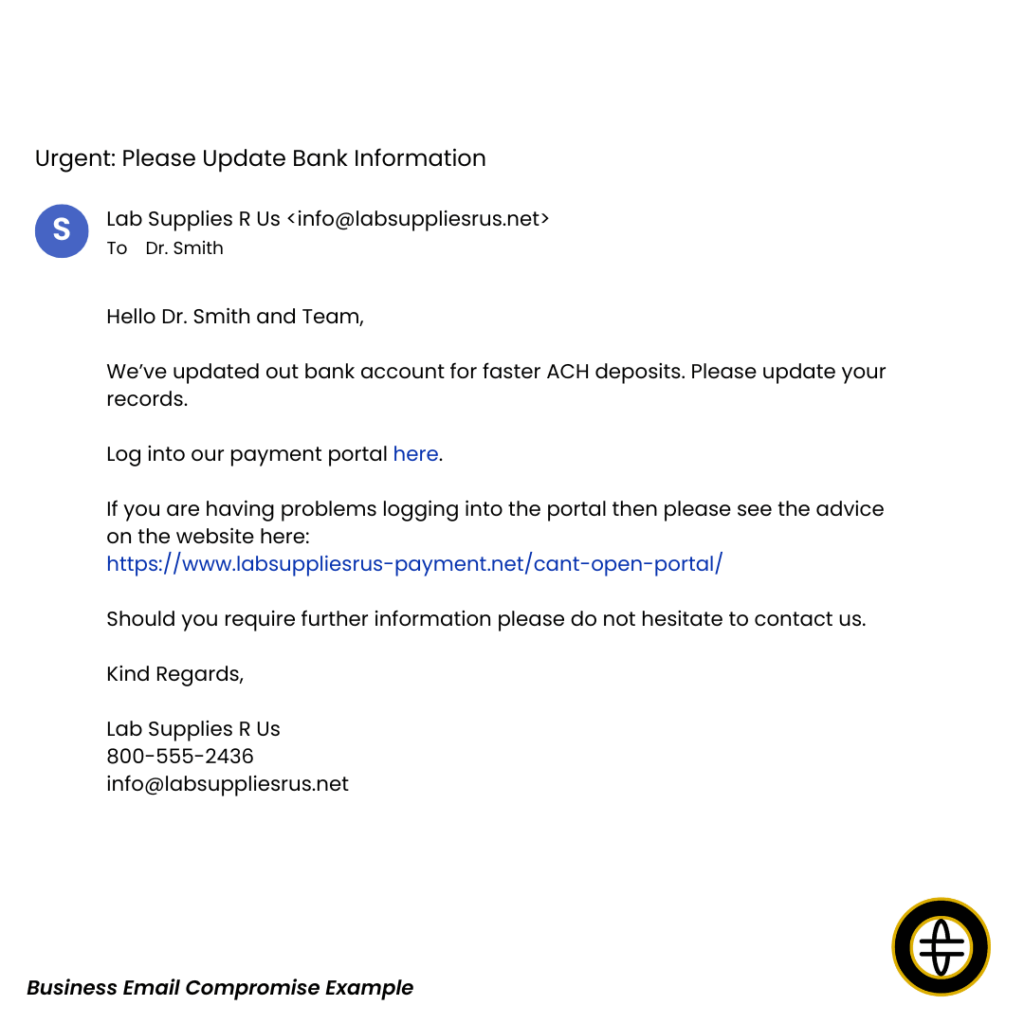How Dental Practices Can Prevent Business Email Compromise (BEC) Scams
Because one bad email shouldn’t cost you your reputation.
If you’ve ever had a team member forward a suspicious email or ask, “Did you really request this payment?”, you’ve brushed shoulders with a Business Email Compromise (BEC) attempt.
And if you haven’t yet...you will.
What is a BEC Scam?
BEC is a social engineering attack where cybercriminals impersonate a trusted source...like your dental supplier, lab, or even your own team. Their goal? To trick someone into transferring money, changing vendor payment info, or sharing access credentials.
Unlike typical phishing, BEC scams:
- Use legitimate-looking emails (sometimes real hacked accounts).
- Contain no malware or sketchy links...just convincing deception that can slip past many traditional security tools.
- Target your front desk staff, billing coordinator, office manager, or CFO.
These scams are alarmingly effective, and dental practices are prime targets.
Why Dental Practices are at High Risk?
You manage high-dollar equipment purchases, insurance claims, third-party vendors, labs, and payroll...all via email.
If you operate a multi-location practice or DSO, you’re especially vulnerable because:
- Multiple team members handle payments
- Decisions are decentralized across clinics
- You rely on email for vendor communication and account updates
- You have minimal margin for downtime
In short? You’re busy, and that makes you vulnerable.
What These Scams Can Look Like in Dentistry
- A supplier emails you: “Our bank account changed—please update the ACH information.” The requester includes small details that make it seem legit. Your office wires thousands of dollars before discovering the change was fraudulent. (see example below)
- A message appears from your office manager or dentist, saying there's an urgent payment needed while they’re traveling between clinics or in a procedure. The timing creates pressure, and the email sounds just plausible enough. Staff act quickly, skipping standard checks.
- A staff member clicks a login link in an email from your “insurance portal” and unknowingly shares credentials...used later to stage attacks across your network.
The "Updated Bank Info" Vendor Scam
5 Steps to Protect Your Dental Practice from BEC Scams
When it comes to protecting your dental practice from business email compromise (BEC) scams, there’s no silver bullet. The most effective strategy is a layered one—combining smart technology with clear, people-first protocols.
Here’s how you can strengthen your practice’s defenses:
1. Use a Secure Email Gateway (SEG)
Invest in an SEG platform that flags spoofed emails, monitors sender behavior, and integrates with your Microsoft or Google workspace.
Tip: Ask your IT partner if your current setup scans for domain impersonation and display name spoofing—most don't by default. Reliable IT partners should have an SEG offering such as Barracuda, Ironscales, or Proofpoint (to name a few).
2. Standardize Vendor Payment Policies
Establish a “verify-before-you-pay” rule. Some simple guidelines:
- Always confirm any changes over the phone or in-person...not by replying to email.
- Require dual approval for payments over a certain threshold.
- Create a single point of vendor contact across all locations.
Pro Tip: Use recognizable internal names for vendors (like “Dr. Chen’s Lab” instead of “Midwest Dental Labs”) so any off-brand communication raises a red flag.
3. Train Your Team (and Then Train Again)
Human error is the #1 vulnerability accounting for 60% of all data breaches. Your team is the first—and often best—line of defense.
A few ways to keep everyone sharp:
- Run quarterly cybersecurity refreshers...especially for billing, HR, and front desk.
- Share examples of recent scams targeting dental offices.
- Teach staff to spot red flags: urgency, misspelled domains, payment changes.
- Do mock phishing tests to build muscle memory.
- Remind your team that it’s okay to pause and ask, “Does this feel right?”
- Build a culture of “Verify Before You Pay.”
“We’ve had clients who avoided thousands in losses because their team flagged a suspicious email after one of our trainings,” says Dan Edwards, CEO of Pact-One Solutions.
4. Lock Down Roles and Escalations
- Remove single-user financial approval workflows.
- In DSOs: enforce cross-location financial oversight with centralized governance.
- Clarify: who can request funds? Who verifies vendors? Who approves changes?
5. Monitor, Log, and Respond
- Use enterprise-grade cybersecurity to monitor your network 24/7/365 and flag unusual activity.
- Set up alerts for payment attempts outside of standard hours.
- If compromised, act fast:
- Freeze accounts
- Update credentials
- Call your IT provider
- Notify authorities
The Cost of Inaction
BEC scams don’t just hit your bank account...they can create:
- Billing delays and vendor friction
- HIPAA concerns if patient data is indirectly exposed
- Cash flow chaos that disrupts scheduling, supply orders, and staff payroll
- Loss of trust from vendors, patients, and staff
According to the FBI's 2024 Internet Crime Report, BEC scams caused over $6.3 billion in reported losses...most of them preventable.
How a Dental-Specific MSP Shields You
When you partner with an IT provider that specializes in dental practices (such as Pact-One), you’re not just getting a support line...you’re gaining a proactive IT team that:
- Detects threats before they reach your inbox
- Implements industry-standard email protections
- Keeps your team sharp and security-savvy
- Understands the specific risks dental practices face
We call it managed IT with a preventative mindset. We don’t just fix problems, we engineer peace of mind.
Ready to Build a Scam-Resistant Practice?
Let’s make sure your growth never gets hijacked by a bad email. Whether you manage one location or thirty, check out these resources to start building an airtight email defense and keep your data—and your dollars—safe.
🙋 Download this FREE guide for your team: “Quick Guide for Dental Teams”
🛡️ Learn more about our cybersecurity services for dental practices
📘 Download our FREE guide: “Ultimate Cybersecurity Guide for Dental Practices”
💬 Explore your options by connecting with one of our dental IT experts today!
FAQ: Business Email Compromise Scams
Have questions about business email compromise in the dental industry? Here are some of the most common questions that we get asked! Click the question to see the answer below.
We provide:
- Advanced email protection tools
- Cybersecurity training for your team
- 24/7/365 threat monitoring and response
Dental IT. Remove the Burden. Embrace the Use.
Quality patient care – it's ultimately why you became a dental professional. But, some business operations can get in the way (such as pesky computer issues or lack of IT support). That’s where Pact-One Solutions can help! Our passion lies in supplying reliable, responsive dental IT support and security that practices can count on.
Whether you’re looking for dental IT services for your startup or searching for more responsive dental IT support – our team of dental IT specialists have you covered. With team members throughout the United States, we offer nationwide support to dental practices of all sizes, specialties, and stages of growth. Our wide range of dental IT services ensure your data is secure, accessible, and protected.
Don't let technology challenges hinder your ability to deliver exceptional dental care. Contact us at info@pact-one.com or 866-722-8663 to join over 3,000 dental professionals thriving with the support of a dedicated dental IT team.




You must be logged in to post a comment.